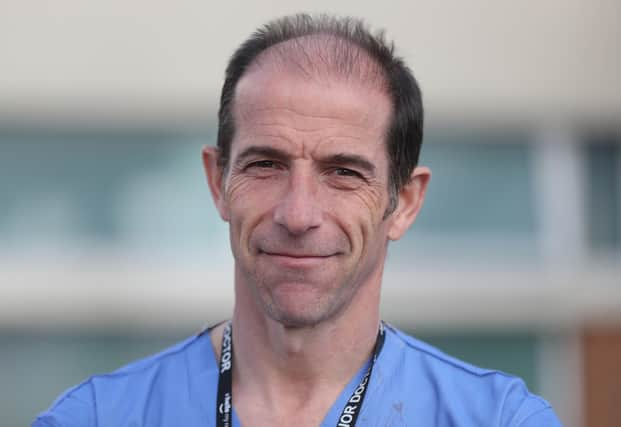Consultant: Real test will come when lockdown restrictions are eased


As politicians consider how to start easing the public out of lockdown, Dr Damien Scullion said Covid-19 will either “proliferate or remain dormant”.
“We’re all concerned about a second peak; we’re also concerned that a second peak may coincide with the seasonal flu, which in many ways could be a lot worse,” he said.
Advertisement
Hide AdAdvertisement
Hide Ad“The real test will come when the isolation measures start to be relaxed and we see how the public react to that and how the virus either proliferates or remains dormant – hopefully it’s the latter.”
Dr Scullion, a senior consultant at Craigavon Area Hospital, paid tribute to the public.
“I think it’s very important to commend the public in Northern Ireland for the way they have adapted to this … and you can see from the figures that this really has worked because certainly we were not as busy as we thought we could be,” he said.
The Co Armagh hospital has been transformed since the pandemic started, with new signage and a loudspeaker formerly used to announce the anti-smoking policy now giving out symptoms of Covid-19.
Advertisement
Hide AdAdvertisement
Hide AdThere are separate respiratory and non-respiratory emergency departments in operation, and even the staff canteen has been moved into temporary marquees outside to enable social distancing.
Inside the intensive care unit there are strict protocols around the wearing of personal protective equipment (PPE), which must be removed before staff can move into other areas of the hospital.
Consultant Michael Perry urged patients needing medical attention to attend hospital.
“We’re noticing that patients are quite sick when they come in … and a lot of patients have told us that they don’t want to come to hospital, they have sat at home and tried to wait it out, worried they might catch coronavirus, so we’ve been trying to encourage the public if they are unwell or having breathing problems or chest pains they need to come to get seen,” he said.
Advertisement
Hide AdAdvertisement
Hide AdDr Maria O’Kane, medical director at the Southern Health Trust, said they are preparing for the next phase.
“What we are starting to see now over the most recent week has been possibly a plateauing of what has gone on, and potentially an overall reduction,” she said.
“We’re beginning to see that, in terms of the numbers of people who present through the emergency departments or respiratory wards, the intensive care units, but what we do know is there are still significant levels of Covid in the community.”
Dr O’Kane said that throughout the pandemic they have had between 6% and 10% of staff off, shielding or with caring responsibilities.
Advertisement
Hide AdAdvertisement
Hide AdShe added that a number of staff have tested positive for Covid-19, but that all have been successfully treated so far.
Dr Scullion said the restriction on visitors, particularly for critically ill patients and those dying, has been difficult.
“Nurses are there and they are the family’s advocate, they let the family know they are there with them, not just treating them medically but all their other needs as well.”